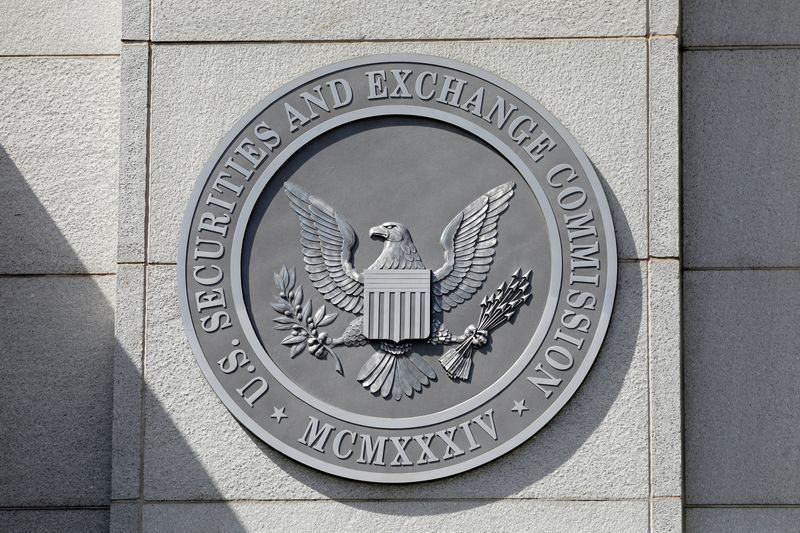By Katanga Johnson
WASHINGTON (Reuters) - A year after the "meme stock" rally humbled hedge funds and roiled Wall Street, U.S. regulators are studying ways to crack down on psychological prompts used by Robinhood (NASDAQ:HOOD) Inc and other commission-free brokers to promote frequent stock trading on smartphone apps.
The Securities and Exchange Commission (SEC) started scrutinizing commission-free brokers like Robinhood, Webull Financial LLC and SoFi Inc last year after retail investors drove GameStop (NYSE:GME) and other "meme stocks" sky high in Jan. 2021.
The furious rally pushed GameStop shares up more than 1,500% at one point and created a "short squeeze" that burned hedge funds that had bet against shares of the video game retailer. Shares of movie theater chain AMC Entertainment (NYSE:AMC) and other companies also soared.
At the height of the frenzy, several brokers restricted trading in the meme stocks, infuriating investors. Robinhood CEO Vlad Tenev and other executives were hauled https://www.reuters.com/article/us-retail-trading-usa-congress/long-tense-with-cat-photo-for-relief-how-the-gamestop-hearing-unfolded-idUSKBN2AI1C4 before U.S. Congress to testify.
The SEC has found that many brokers, as well as roboadvisors, increasingly use analytics driven by artificial intelligence, video game-like features and other behavioral prompts to encourage stock trading or to sell certain products.
Trading contests, points and rewards are just some of these techniques. There are also lively sounds and bright colors, notifications, social networking tools, and curated lists of trading and investment ideas, among other practices.
"The SEC has been very concerned that many younger investors, many of them too young to legally drink alcohol, are instead getting intoxicated by digital engagement in the market," said Howard Fischer, a partner at law firm Moses & Singer, adding the industry is likely to push back hard.
"It is likely to have a war on its hands."
Commission-free brokers say they are democratizing investing, making it easy and fun for anyone to trade. In a blog post on Tuesday evening, Robinhood said it had added resources to help customers learn investment basics.
Critics say commission-free brokers try to maximize retail trading volumes because they earn lucrative fees for routing orders to wholesale market-makers. This could be a conflict of interest; studies show retail investors generally lose money when they churn their portfolio.
"Americans are bombarded every day by behavioral prompts ... the brokerage apps and the roboadvisors are doing that as well," SEC chair Gary Gensler told CNBC last week. "Their motivation is to make more revenues."
On Wednesday, Gensler said in a statement that he was looking forward to the staff's recommendations on digital engagement practices, without elaborating.
In an August consultation https://www.reuters.com/legal/transactional/us-markets-regulator-wants-public-feedback-firms-digital-engagement-practices-2021-08-27, the SEC suggested that digital prompts may sometimes constitute an investment recommendation that falls under Regulation Best Interest. That 2019 rule requires a broker-dealer making a recommendation to act in the best interest of the retail customer and identify conflicts of interest.
If the SEC went that route, firms that use digital engagement tools would probably have to make extensive new disclosures. That compliance burden would complicate their business and could make them more vulnerable to lawsuits.
"It could conceivably be a game-changer," said Fischer.
NOVEL TERRITORY?
At the time of the meme stock rally, there were more than 100 million retail users/accounts combined open at six of the top online brokerages, Reuters reported last year.
A survey by the Financial Industry Regulatory Authority (FINRA), which has also stepped up scrutiny of game-like trading features, found that of investors who opened an investment account in 2020, 66% were new to investing.
Industry groups, including the Securities Industry and Financial Markets Association (SIFMA), say digital engagement practices can be beneficial for investors, for example when they are used to steer them to save more money or invest long term.
In an October response to the SEC's consultation, SIFMA also said it believes that in the vast majority of interactions, the use of digital engagement practices would not constitute a recommendation, based on "well-established" guidance.
Some experts who support regulation concede the SEC is veering into novel territory, noting there is limited research into how digital engagement practices directly affect investor decision-making.
Financial institutions have the best data on the issue but little incentive to share it widely, said Edwin Hu, a research fellow at New York University and a former SEC official.
"One key question is whether user interface design can be considered investment advice and to what extent interface design affects investment decisions at all. This is a very difficult empirical and legal question the SEC faces," said Hu.
Studies on the gambling and gaming industries suggest that noises, bright colors and other sensory details that aim to replicate real-world stimulation "steer users to act," said James Fielder, a professor at Colorado State University.
"If...you build these experiences into trading as if it is a game, but with real money on the line, then it's a big deal."

Some experts worry digital engagement practices are growing so sophisticated that they may generally increase trading without obvious individual prompts. That could mean the Regulation Best Interest approach may be insufficient, the SEC's internal investor advocate, Rick Fleming, has warned.
"If Reg BI proves to be inadequate to protect investors, I believe the Commission should go back to the drawing board so that its critical investor protections no longer rise and fall on whether the broker-dealer made a specific recommendation." he added.